Transactional Attorney Resume Examples

Jul 18, 2024
|
12 min read
Craft your perfect transactional attorney resume: Essential tips to highlight your skills and win clients.
Rated by 348 people
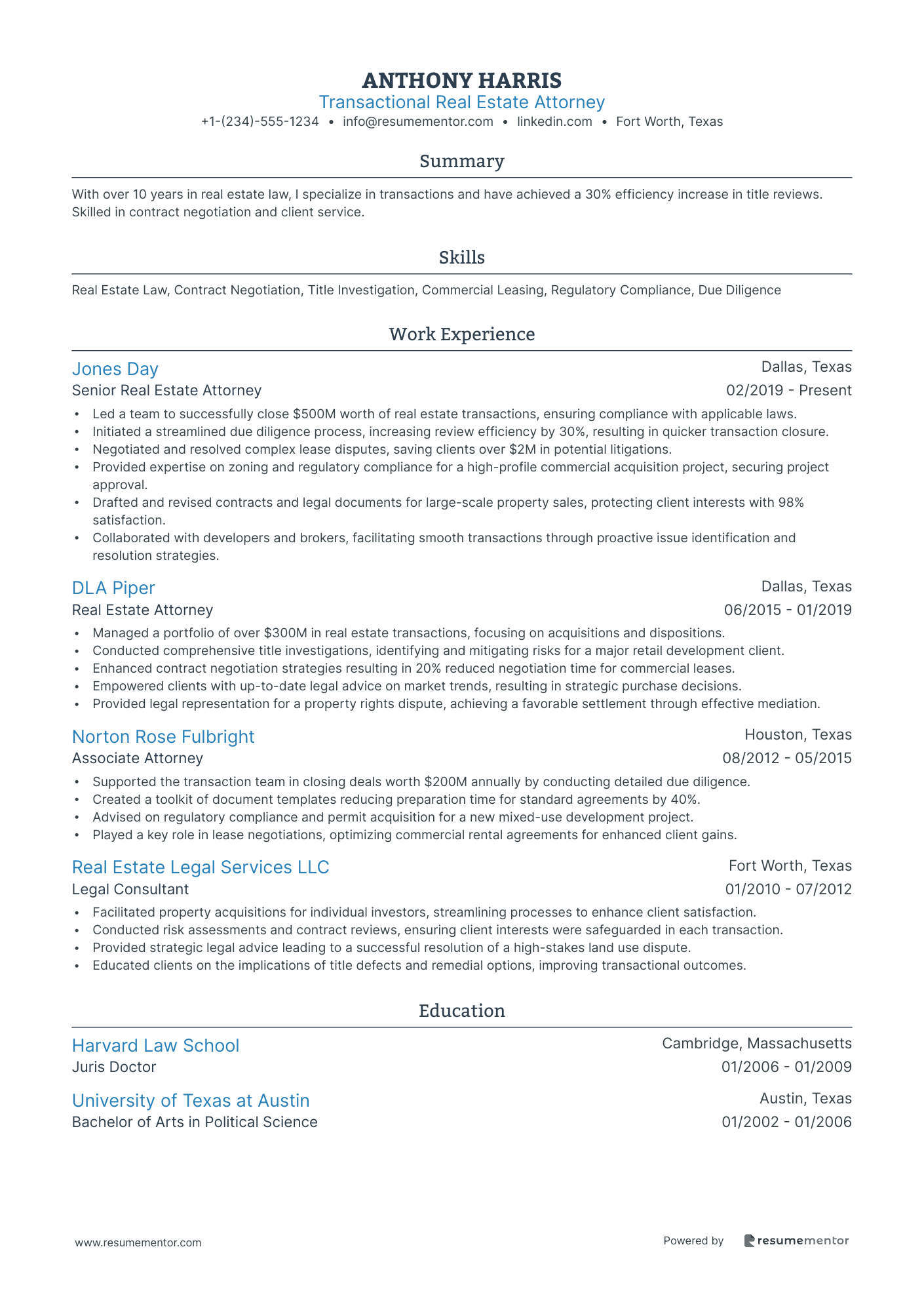
Transactional Real Estate Attorney
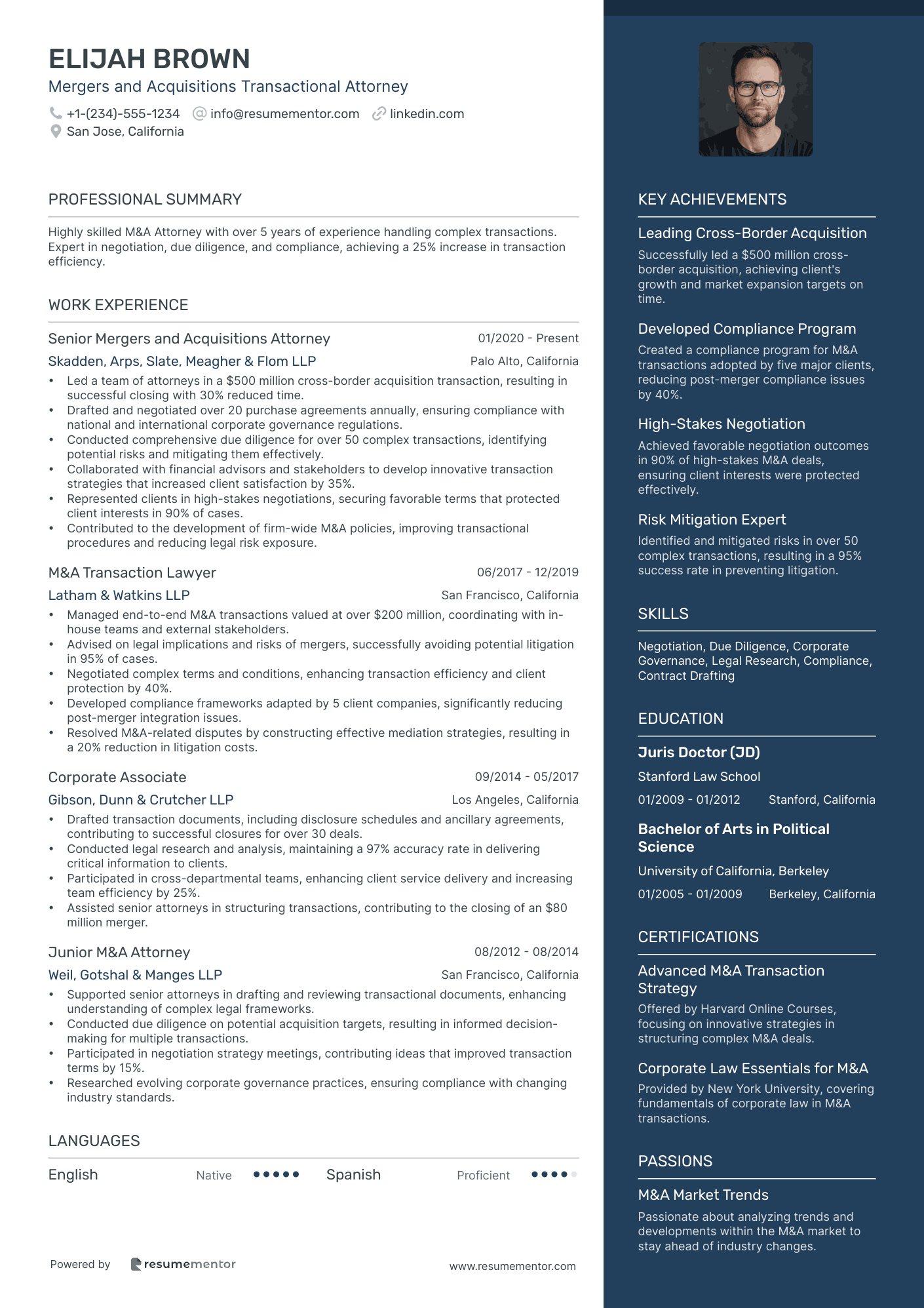
Mergers and Acquisitions Transactional Attorney
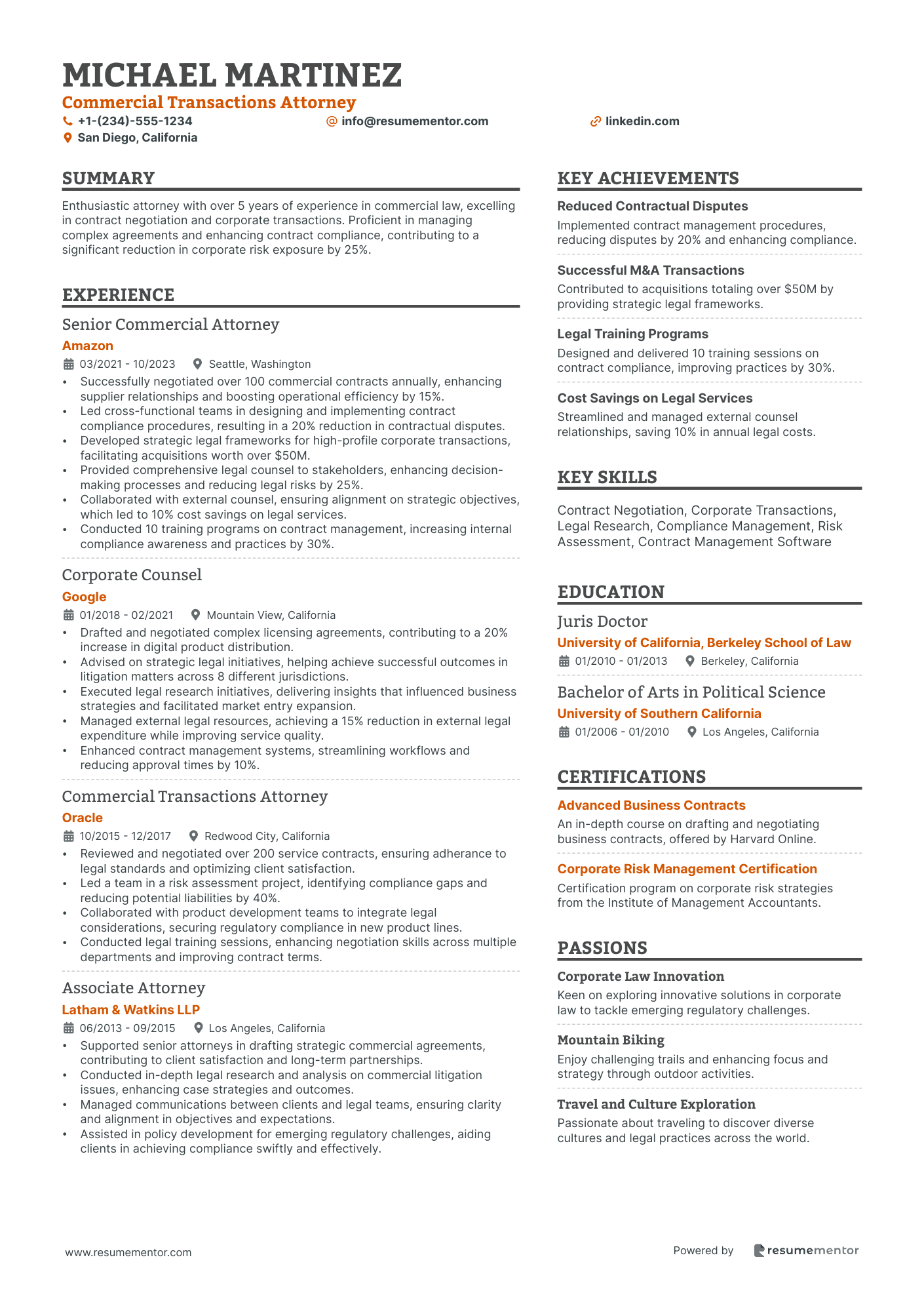
Commercial Transactions Attorney
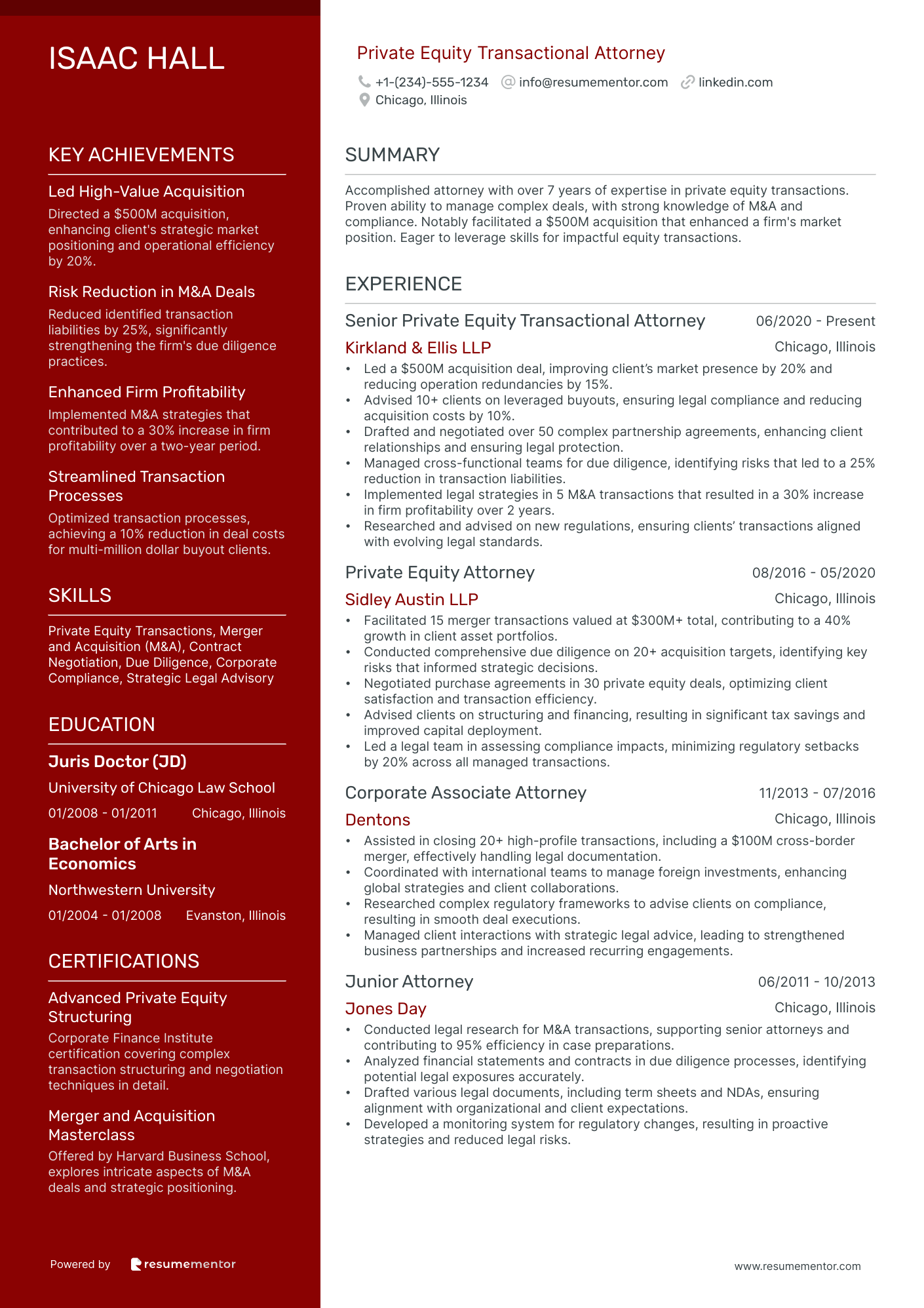
Private Equity Transactional Attorney
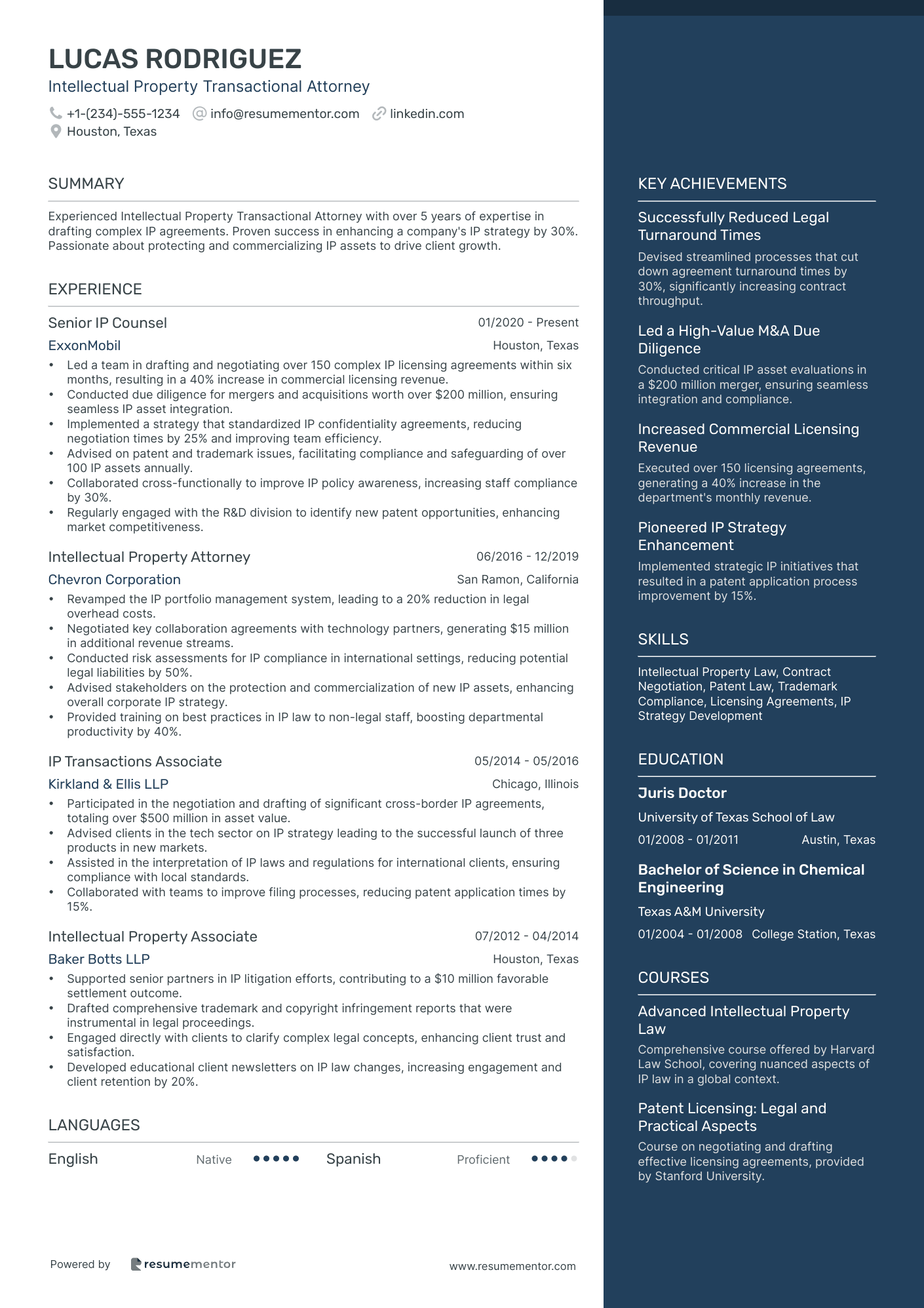
Intellectual Property Transactional Attorney
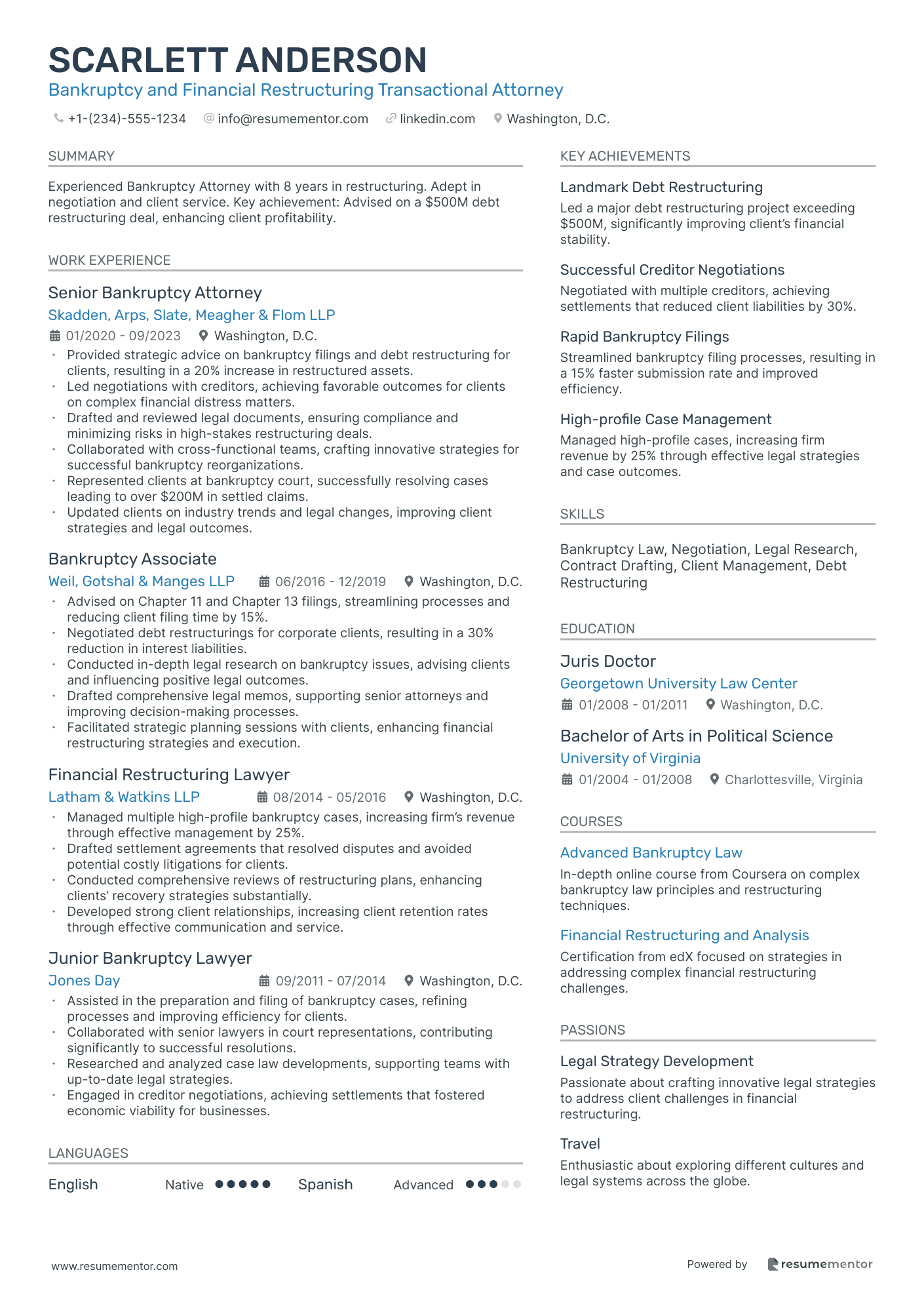
Bankruptcy and Financial Restructuring Transactional Attorney
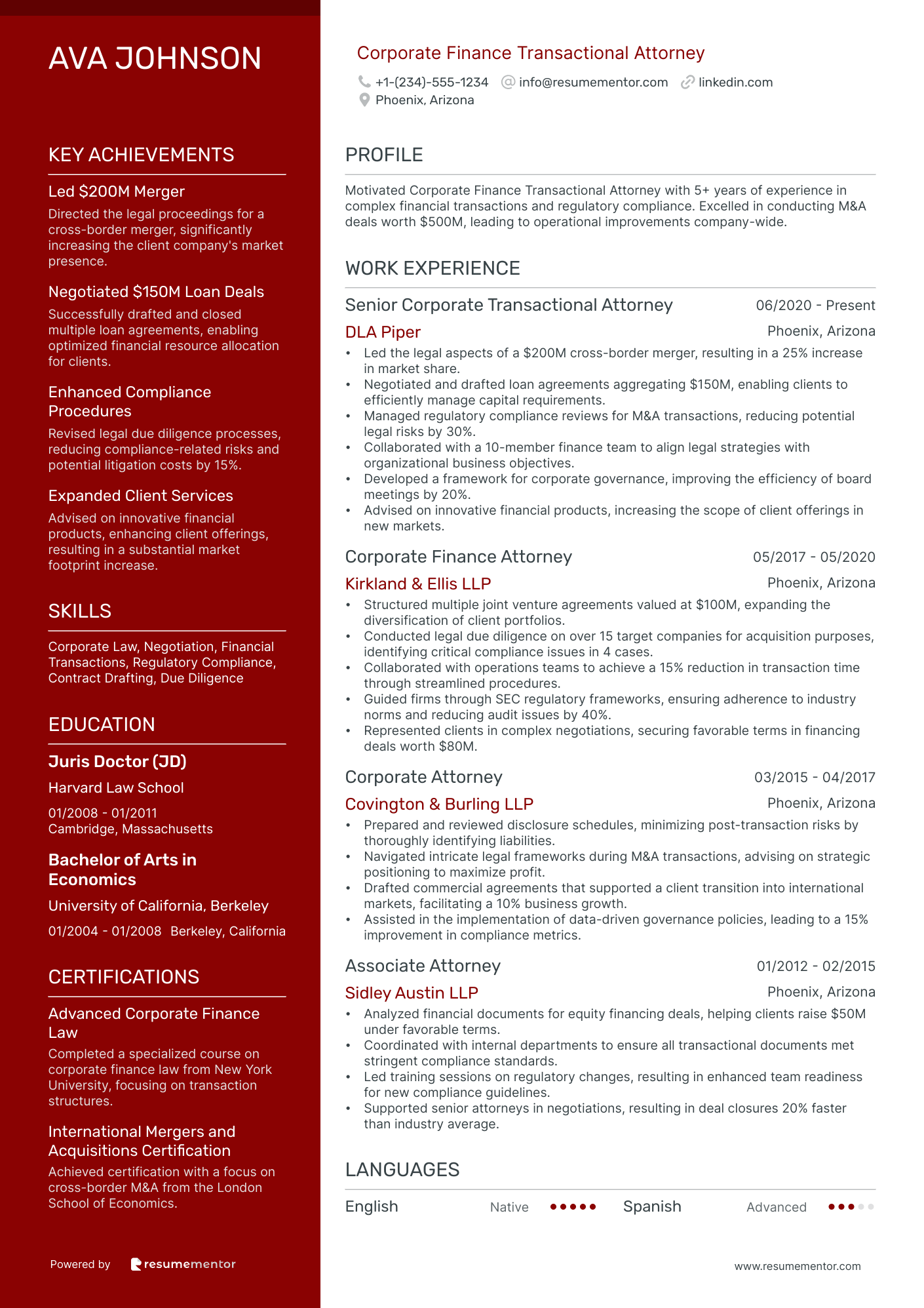
Corporate Finance Transactional Attorney
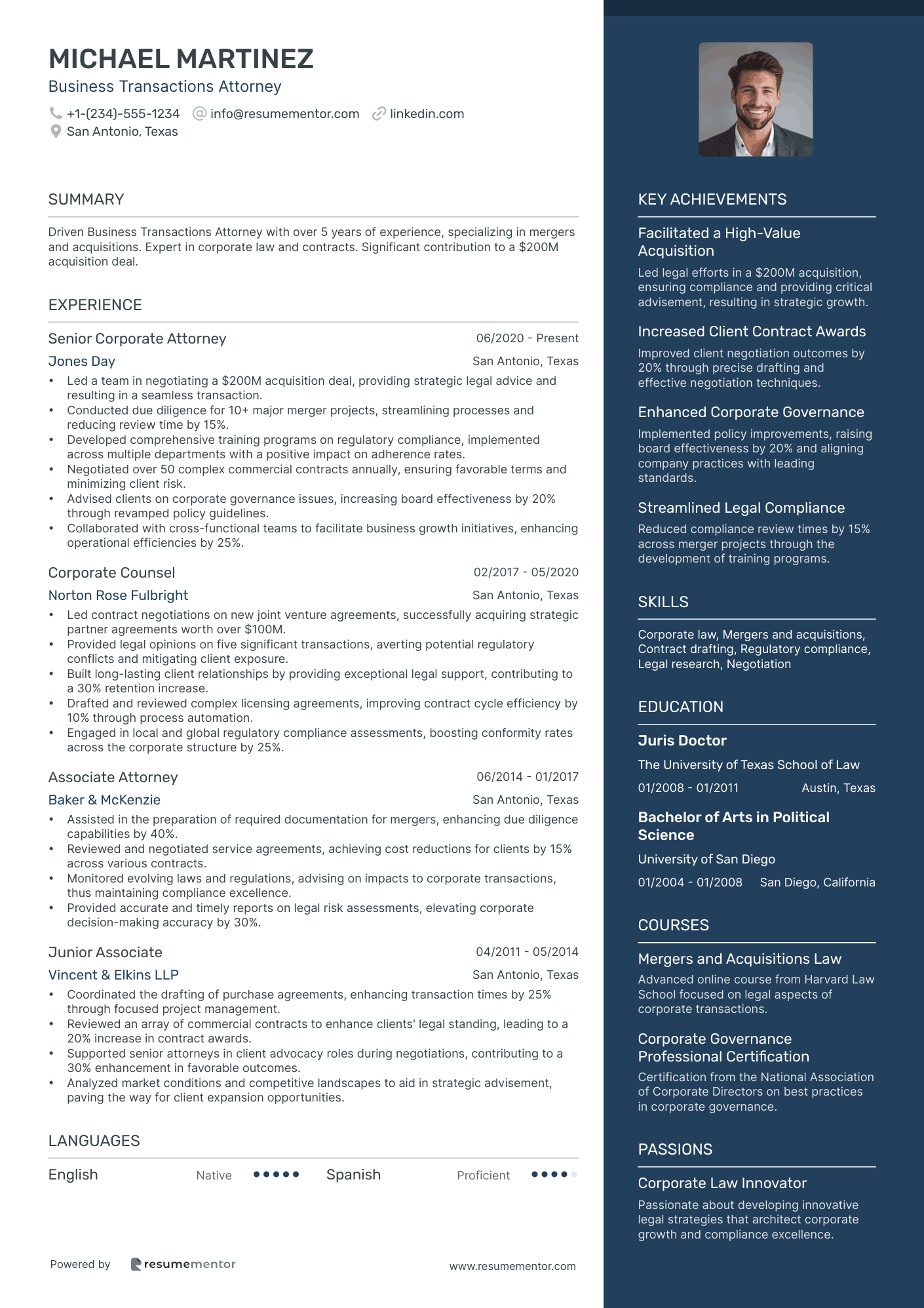
Business Transactions Attorney
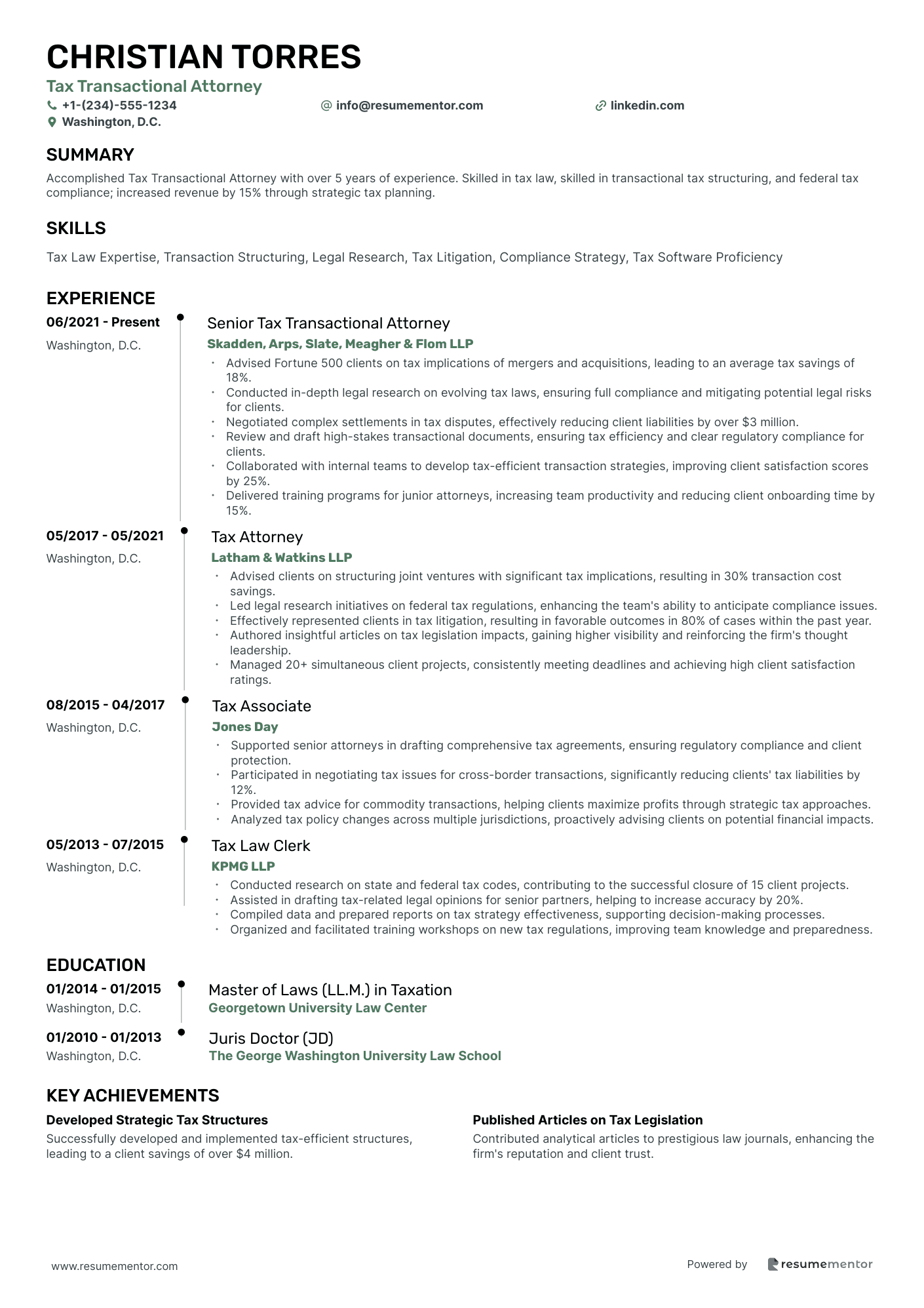
Tax Transactional Attorney

Transactional Real Estate Attorney resume sample
- •Led a team to successfully close $500M worth of real estate transactions, ensuring compliance with applicable laws.
- •Initiated a streamlined due diligence process, increasing review efficiency by 30%, resulting in quicker transaction closure.
- •Negotiated and resolved complex lease disputes, saving clients over $2M in potential litigations.
- •Provided expertise on zoning and regulatory compliance for a high-profile commercial acquisition project, securing project approval.
- •Drafted and revised contracts and legal documents for large-scale property sales, protecting client interests with 98% satisfaction.
- •Collaborated with developers and brokers, facilitating smooth transactions through proactive issue identification and resolution strategies.
- •Managed a portfolio of over $300M in real estate transactions, focusing on acquisitions and dispositions.
- •Conducted comprehensive title investigations, identifying and mitigating risks for a major retail development client.
- •Enhanced contract negotiation strategies resulting in 20% reduced negotiation time for commercial leases.
- •Empowered clients with up-to-date legal advice on market trends, resulting in strategic purchase decisions.
- •Provided legal representation for a property rights dispute, achieving a favorable settlement through effective mediation.
- •Supported the transaction team in closing deals worth $200M annually by conducting detailed due diligence.
- •Created a toolkit of document templates reducing preparation time for standard agreements by 40%.
- •Advised on regulatory compliance and permit acquisition for a new mixed-use development project.
- •Played a key role in lease negotiations, optimizing commercial rental agreements for enhanced client gains.
- •Facilitated property acquisitions for individual investors, streamlining processes to enhance client satisfaction.
- •Conducted risk assessments and contract reviews, ensuring client interests were safeguarded in each transaction.
- •Provided strategic legal advice leading to a successful resolution of a high-stakes land use dispute.
- •Educated clients on the implications of title defects and remedial options, improving transactional outcomes.
Mergers and Acquisitions Transactional Attorney resume sample
- •Led a team of attorneys in a $500 million cross-border acquisition transaction, resulting in successful closing with 30% reduced time.
- •Drafted and negotiated over 20 purchase agreements annually, ensuring compliance with national and international corporate governance regulations.
- •Conducted comprehensive due diligence for over 50 complex transactions, identifying potential risks and mitigating them effectively.
- •Collaborated with financial advisors and stakeholders to develop innovative transaction strategies that increased client satisfaction by 35%.
- •Represented clients in high-stakes negotiations, securing favorable terms that protected client interests in 90% of cases.
- •Contributed to the development of firm-wide M&A policies, improving transactional procedures and reducing legal risk exposure.
- •Managed end-to-end M&A transactions valued at over $200 million, coordinating with in-house teams and external stakeholders.
- •Advised on legal implications and risks of mergers, successfully avoiding potential litigation in 95% of cases.
- •Negotiated complex terms and conditions, enhancing transaction efficiency and client protection by 40%.
- •Developed compliance frameworks adapted by 5 client companies, significantly reducing post-merger integration issues.
- •Resolved M&A-related disputes by constructing effective mediation strategies, resulting in a 20% reduction in litigation costs.
- •Drafted transaction documents, including disclosure schedules and ancillary agreements, contributing to successful closures for over 30 deals.
- •Conducted legal research and analysis, maintaining a 97% accuracy rate in delivering critical information to clients.
- •Participated in cross-departmental teams, enhancing client service delivery and increasing team efficiency by 25%.
- •Assisted senior attorneys in structuring transactions, contributing to the closing of an $80 million merger.
- •Supported senior attorneys in drafting and reviewing transactional documents, enhancing understanding of complex legal frameworks.
- •Conducted due diligence on potential acquisition targets, resulting in informed decision-making for multiple transactions.
- •Participated in negotiation strategy meetings, contributing ideas that improved transaction terms by 15%.
- •Researched evolving corporate governance practices, ensuring compliance with changing industry standards.
Commercial Transactions Attorney resume sample
- •Successfully negotiated over 100 commercial contracts annually, enhancing supplier relationships and boosting operational efficiency by 15%.
- •Led cross-functional teams in designing and implementing contract compliance procedures, resulting in a 20% reduction in contractual disputes.
- •Developed strategic legal frameworks for high-profile corporate transactions, facilitating acquisitions worth over $50M.
- •Provided comprehensive legal counsel to stakeholders, enhancing decision-making processes and reducing legal risks by 25%.
- •Collaborated with external counsel, ensuring alignment on strategic objectives, which led to 10% cost savings on legal services.
- •Conducted 10 training programs on contract management, increasing internal compliance awareness and practices by 30%.
- •Drafted and negotiated complex licensing agreements, contributing to a 20% increase in digital product distribution.
- •Advised on strategic legal initiatives, helping achieve successful outcomes in litigation matters across 8 different jurisdictions.
- •Executed legal research initiatives, delivering insights that influenced business strategies and facilitated market entry expansion.
- •Managed external legal resources, achieving a 15% reduction in external legal expenditure while improving service quality.
- •Enhanced contract management systems, streamlining workflows and reducing approval times by 10%.
- •Reviewed and negotiated over 200 service contracts, ensuring adherance to legal standards and optimizing client satisfaction.
- •Led a team in a risk assessment project, identifying compliance gaps and reducing potential liabilities by 40%.
- •Collaborated with product development teams to integrate legal considerations, securing regulatory compliance in new product lines.
- •Conducted legal training sessions, enhancing negotiation skills across multiple departments and improving contract terms.
- •Supported senior attorneys in drafting strategic commercial agreements, contributing to client satisfaction and long-term partnerships.
- •Conducted in-depth legal research and analysis on commercial litigation issues, enhancing case strategies and outcomes.
- •Managed communications between clients and legal teams, ensuring clarity and alignment in objectives and expectations.
- •Assisted in policy development for emerging regulatory challenges, aiding clients in achieving compliance swiftly and effectively.
Private Equity Transactional Attorney resume sample
- •Led a $500M acquisition deal, improving client’s market presence by 20% and reducing operation redundancies by 15%.
- •Advised 10+ clients on leveraged buyouts, ensuring legal compliance and reducing acquisition costs by 10%.
- •Drafted and negotiated over 50 complex partnership agreements, enhancing client relationships and ensuring legal protection.
- •Managed cross-functional teams for due diligence, identifying risks that led to a 25% reduction in transaction liabilities.
- •Implemented legal strategies in 5 M&A transactions that resulted in a 30% increase in firm profitability over 2 years.
- •Researched and advised on new regulations, ensuring clients’ transactions aligned with evolving legal standards.
- •Facilitated 15 merger transactions valued at $300M+ total, contributing to a 40% growth in client asset portfolios.
- •Conducted comprehensive due diligence on 20+ acquisition targets, identifying key risks that informed strategic decisions.
- •Negotiated purchase agreements in 30 private equity deals, optimizing client satisfaction and transaction efficiency.
- •Advised clients on structuring and financing, resulting in significant tax savings and improved capital deployment.
- •Led a legal team in assessing compliance impacts, minimizing regulatory setbacks by 20% across all managed transactions.
- •Assisted in closing 20+ high-profile transactions, including a $100M cross-border merger, effectively handling legal documentation.
- •Coordinated with international teams to manage foreign investments, enhancing global strategies and client collaborations.
- •Researched complex regulatory frameworks to advise clients on compliance, resulting in smooth deal executions.
- •Managed client interactions with strategic legal advice, leading to strengthened business partnerships and increased recurring engagements.
- •Conducted legal research for M&A transactions, supporting senior attorneys and contributing to 95% efficiency in case preparations.
- •Analyzed financial statements and contracts in due diligence processes, identifying potential legal exposures accurately.
- •Drafted various legal documents, including term sheets and NDAs, ensuring alignment with organizational and client expectations.
- •Developed a monitoring system for regulatory changes, resulting in proactive strategies and reduced legal risks.
Intellectual Property Transactional Attorney resume sample
- •Led a team in drafting and negotiating over 150 complex IP licensing agreements within six months, resulting in a 40% increase in commercial licensing revenue.
- •Conducted due diligence for mergers and acquisitions worth over $200 million, ensuring seamless IP asset integration.
- •Implemented a strategy that standardized IP confidentiality agreements, reducing negotiation times by 25% and improving team efficiency.
- •Advised on patent and trademark issues, facilitating compliance and safeguarding of over 100 IP assets annually.
- •Collaborated cross-functionally to improve IP policy awareness, increasing staff compliance by 30%.
- •Regularly engaged with the R&D division to identify new patent opportunities, enhancing market competitiveness.
- •Revamped the IP portfolio management system, leading to a 20% reduction in legal overhead costs.
- •Negotiated key collaboration agreements with technology partners, generating $15 million in additional revenue streams.
- •Conducted risk assessments for IP compliance in international settings, reducing potential legal liabilities by 50%.
- •Advised stakeholders on the protection and commercialization of new IP assets, enhancing overall corporate IP strategy.
- •Provided training on best practices in IP law to non-legal staff, boosting departmental productivity by 40%.
- •Participated in the negotiation and drafting of significant cross-border IP agreements, totaling over $500 million in asset value.
- •Advised clients in the tech sector on IP strategy leading to the successful launch of three products in new markets.
- •Assisted in the interpretation of IP laws and regulations for international clients, ensuring compliance with local standards.
- •Collaborated with teams to improve filing processes, reducing patent application times by 15%.
- •Supported senior partners in IP litigation efforts, contributing to a $10 million favorable settlement outcome.
- •Drafted comprehensive trademark and copyright infringement reports that were instrumental in legal proceedings.
- •Engaged directly with clients to clarify complex legal concepts, enhancing client trust and satisfaction.
- •Developed educational client newsletters on IP law changes, increasing engagement and client retention by 20%.
Bankruptcy and Financial Restructuring Transactional Attorney resume sample
- •Provided strategic advice on bankruptcy filings and debt restructuring for clients, resulting in a 20% increase in restructured assets.
- •Led negotiations with creditors, achieving favorable outcomes for clients on complex financial distress matters.
- •Drafted and reviewed legal documents, ensuring compliance and minimizing risks in high-stakes restructuring deals.
- •Collaborated with cross-functional teams, crafting innovative strategies for successful bankruptcy reorganizations.
- •Represented clients at bankruptcy court, successfully resolving cases leading to over $200M in settled claims.
- •Updated clients on industry trends and legal changes, improving client strategies and legal outcomes.
- •Advised on Chapter 11 and Chapter 13 filings, streamlining processes and reducing client filing time by 15%.
- •Negotiated debt restructurings for corporate clients, resulting in a 30% reduction in interest liabilities.
- •Conducted in-depth legal research on bankruptcy issues, advising clients and influencing positive legal outcomes.
- •Drafted comprehensive legal memos, supporting senior attorneys and improving decision-making processes.
- •Facilitated strategic planning sessions with clients, enhancing financial restructuring strategies and execution.
- •Managed multiple high-profile bankruptcy cases, increasing firm’s revenue through effective management by 25%.
- •Drafted settlement agreements that resolved disputes and avoided potential costly litigations for clients.
- •Conducted comprehensive reviews of restructuring plans, enhancing clients’ recovery strategies substantially.
- •Developed strong client relationships, increasing client retention rates through effective communication and service.
- •Assisted in the preparation and filing of bankruptcy cases, refining processes and improving efficiency for clients.
- •Collaborated with senior lawyers in court representations, contributing significantly to successful resolutions.
- •Researched and analyzed case law developments, supporting teams with up-to-date legal strategies.
- •Engaged in creditor negotiations, achieving settlements that fostered economic viability for businesses.
Corporate Finance Transactional Attorney resume sample
- •Led the legal aspects of a $200M cross-border merger, resulting in a 25% increase in market share.
- •Negotiated and drafted loan agreements aggregating $150M, enabling clients to efficiently manage capital requirements.
- •Managed regulatory compliance reviews for M&A transactions, reducing potential legal risks by 30%.
- •Collaborated with a 10-member finance team to align legal strategies with organizational business objectives.
- •Developed a framework for corporate governance, improving the efficiency of board meetings by 20%.
- •Advised on innovative financial products, increasing the scope of client offerings in new markets.
- •Structured multiple joint venture agreements valued at $100M, expanding the diversification of client portfolios.
- •Conducted legal due diligence on over 15 target companies for acquisition purposes, identifying critical compliance issues in 4 cases.
- •Collaborated with operations teams to achieve a 15% reduction in transaction time through streamlined procedures.
- •Guided firms through SEC regulatory frameworks, ensuring adherence to industry norms and reducing audit issues by 40%.
- •Represented clients in complex negotiations, securing favorable terms in financing deals worth $80M.
- •Prepared and reviewed disclosure schedules, minimizing post-transaction risks by thoroughly identifying liabilities.
- •Navigated intricate legal frameworks during M&A transactions, advising on strategic positioning to maximize profit.
- •Drafted commercial agreements that supported a client transition into international markets, facilitating a 10% business growth.
- •Assisted in the implementation of data-driven governance policies, leading to a 15% improvement in compliance metrics.
- •Analyzed financial documents for equity financing deals, helping clients raise $50M under favorable terms.
- •Coordinated with internal departments to ensure all transactional documents met stringent compliance standards.
- •Led training sessions on regulatory changes, resulting in enhanced team readiness for new compliance guidelines.
- •Supported senior attorneys in negotiations, resulting in deal closures 20% faster than industry average.
Business Transactions Attorney resume sample
- •Led a team in negotiating a $200M acquisition deal, providing strategic legal advice and resulting in a seamless transaction.
- •Conducted due diligence for 10+ major merger projects, streamlining processes and reducing review time by 15%.
- •Developed comprehensive training programs on regulatory compliance, implemented across multiple departments with a positive impact on adherence rates.
- •Negotiated over 50 complex commercial contracts annually, ensuring favorable terms and minimizing client risk.
- •Advised clients on corporate governance issues, increasing board effectiveness by 20% through revamped policy guidelines.
- •Collaborated with cross-functional teams to facilitate business growth initiatives, enhancing operational efficiencies by 25%.
- •Led contract negotiations on new joint venture agreements, successfully acquiring strategic partner agreements worth over $100M.
- •Provided legal opinions on five significant transactions, averting potential regulatory conflicts and mitigating client exposure.
- •Built long-lasting client relationships by providing exceptional legal support, contributing to a 30% retention increase.
- •Drafted and reviewed complex licensing agreements, improving contract cycle efficiency by 10% through process automation.
- •Engaged in local and global regulatory compliance assessments, boosting conformity rates across the corporate structure by 25%.
- •Assisted in the preparation of required documentation for mergers, enhancing due diligence capabilities by 40%.
- •Reviewed and negotiated service agreements, achieving cost reductions for clients by 15% across various contracts.
- •Monitored evolving laws and regulations, advising on impacts to corporate transactions, thus maintaining compliance excellence.
- •Provided accurate and timely reports on legal risk assessments, elevating corporate decision-making accuracy by 30%.
- •Coordinated the drafting of purchase agreements, enhancing transaction times by 25% through focused project management.
- •Reviewed an array of commercial contracts to enhance clients' legal standing, leading to a 20% increase in contract awards.
- •Supported senior attorneys in client advocacy roles during negotiations, contributing to a 30% enhancement in favorable outcomes.
- •Analyzed market conditions and competitive landscapes to aid in strategic advisement, paving the way for client expansion opportunities.
Tax Transactional Attorney resume sample
- •Advised Fortune 500 clients on tax implications of mergers and acquisitions, leading to an average tax savings of 18%.
- •Conducted in-depth legal research on evolving tax laws, ensuring full compliance and mitigating potential legal risks for clients.
- •Negotiated complex settlements in tax disputes, effectively reducing client liabilities by over $3 million.
- •Review and draft high-stakes transactional documents, ensuring tax efficiency and clear regulatory compliance for clients.
- •Collaborated with internal teams to develop tax-efficient transaction strategies, improving client satisfaction scores by 25%.
- •Delivered training programs for junior attorneys, increasing team productivity and reducing client onboarding time by 15%.
- •Advised clients on structuring joint ventures with significant tax implications, resulting in 30% transaction cost savings.
- •Led legal research initiatives on federal tax regulations, enhancing the team's ability to anticipate compliance issues.
- •Effectively represented clients in tax litigation, resulting in favorable outcomes in 80% of cases within the past year.
- •Authored insightful articles on tax legislation impacts, gaining higher visibility and reinforcing the firm's thought leadership.
- •Managed 20+ simultaneous client projects, consistently meeting deadlines and achieving high client satisfaction ratings.
- •Supported senior attorneys in drafting comprehensive tax agreements, ensuring regulatory compliance and client protection.
- •Participated in negotiating tax issues for cross-border transactions, significantly reducing clients' tax liabilities by 12%.
- •Provided tax advice for commodity transactions, helping clients maximize profits through strategic tax approaches.
- •Analyzed tax policy changes across multiple jurisdictions, proactively advising clients on potential financial impacts.
- •Conducted research on state and federal tax codes, contributing to the successful closure of 15 client projects.
- •Assisted in drafting tax-related legal opinions for senior partners, helping to increase accuracy by 20%.
- •Compiled data and prepared reports on tax strategy effectiveness, supporting decision-making processes.
- •Organized and facilitated training workshops on new tax regulations, improving team knowledge and preparedness.
Crafting a transactional attorney resume is much like drafting a complex legal document where every detail plays a role. Your skills in deal structuring, corporate governance, and client negotiations are invaluable assets, yet conveying these on a resume can be challenging. Employers look for your attention to detail and ability to close deals, making your resume your first opportunity to capture their interest.
To express your skills effectively, starting with a strong structure is essential, much like the foundation of a solid contract. Using a resume template helps you organize your experience and skills in a clear, professional way, ensuring nothing is left to chance. Selecting a template that aligns with your career level and goals reinforces this foundation.
A well-structured resume allows you to seamlessly highlight your legal skills and accomplishments. Each section should transition smoothly to the next, emphasizing your problem-solving capabilities and expertise. With the right format, your achievements are spotlighted, weaving a compelling narrative for your candidacy.
Securing a job as a transactional attorney involves demonstrating your value clearly and effectively. Your resume acts as your opening statement, where clarity and precision are crucial. By choosing a professional template, you ensure your qualifications stand out, paving the way for opportunities in the competitive legal arena.
Key Takeaways
- A transactional attorney resume should clearly convey legal expertise and ability to manage complex deals, with attention to detail being paramount.
- Selecting a professional resume template aligned with one's career level and goals ensures a solid structure for presenting skills and experiences effectively.
- Organizing work experience in reverse chronological order allows employers to easily recognize relevant and recent roles, placing emphasis on quantifiable achievements.
- Proper formatting, including the use of a chronological layout, modern fonts, and maintaining consistent margins and file types, contributes to a polished and professional resume.
- Including sections on education, certifications, and relevant skills—hard and soft—enhances the resume's ability to stand out in a competitive legal market.
What to focus on when writing your transactional attorney resume
A transactional attorney resume should convey your legal expertise and your skill in managing complex deals with accuracy and care. Highlighting your talents in contract drafting, negotiation, and business law effectively showcases your impact in driving successful financial outcomes for clients.
How to structure your transactional attorney resume
- Contact Information — Ensure your full name, phone number, email address, and LinkedIn profile are accurate and professional. This is your first touchpoint with potential employers, so all details need to be up-to-date and neatly presented to make a strong first impression.
- Professional Summary — Start with a brief overview of your experience that emphasizes key skills and notable achievements. This section should quickly engage the reader's interest and give a snapshot of your career accomplishments and goals.
- Work Experience — Detail your past roles, including job titles, companies, locations, and dates, to demonstrate your career progression and accomplishments. Use bullet points to outline your responsibilities and achievements with quantifiable results, showing how you've contributed to successful outcomes in your previous positions.
- Education — List your degrees, institutions, and graduation dates, noting any relevant honors or specializations. This information supports your qualifications and readiness for the role, emphasizing your commitment to continual learning in transactional law.
- Skills — Highlight abilities such as contract negotiation, mergers and acquisitions, corporate governance, and due diligence to underscore your expertise in the field. These skills should reflect your ability to handle the practical aspects of transactional work efficiently.
- Certifications and Licenses — Mention your bar admissions and any related certifications to reinforce your qualifications in transactional work. This section confirms your credentials and your commitment to maintaining professional standards.
To further strengthen your resume, consider sections like "Professional Affiliations," "Published Works," or "Languages" for added depth. Below, we'll cover each section more in-depth to ensure your resume is as compelling as possible.
Which resume format to choose
Crafting a successful transactional attorney resume starts with choosing the right format. A chronological layout is best suited for showcasing your experience and growth over time. This format delivers a clear, step-by-step view of your career path, helping law firms quickly assess your background and abilities.
The choice of font adds to the professional feel of your resume. Opting for modern fonts like Raleway, Lato, or Montserrat gives your resume a contemporary and polished appearance. While the font may seem like a small detail, it contributes to the overall impression you make on potential employers, subtly enhancing the document’s readability and aesthetic appeal.
When it comes to saving your resume, PDFs are essential. They maintain the integrity of your formatting across various devices and software, ensuring that your resume looks the same to every viewer. This consistency is a vital aspect of presenting yourself as thorough and detail-oriented, which is crucial in the legal field.
Margins might appear minor, but they play a critical role in how your resume is perceived. Keeping margins at about one inch on all sides ensures your content isn’t cramped, making it more approachable and easier to read. Good margins give structure and a clean look to your resume, reinforcing the professionalism expected in a transactional attorney's application.
Each aspect—format, font, file type, and margins—contributes to a cohesive and professional document that reflects your capabilities and attention to detail as a transactional attorney.
How to write a quantifiable resume experience section
A standout experience section for a transactional attorney resume sets you apart by clearly showcasing your expertise and achievements. It helps potential employers gain a clear understanding of your value by focusing on past accomplishments and the impact you've made in previous roles. Structuring it in reverse chronological order is beneficial, as it allows hiring managers to easily identify your most recent and relevant work, emphasizing both your currency and experience.
This section not only highlights your skills but serves as concrete evidence of your performance history. Tailoring your resume to fit the specific job ad is crucial; this means spotlighting experiences that match the role's requirements. By focusing on relevant job titles and responsibilities, you effectively demonstrate your attention to detail, strategic thinking, and ability to close deals. Keeping the timeframe to the last 10-15 years avoids cluttering your resume with outdated experiences. Action words like "negotiated," "drafted," and "secured" effectively communicate your role in transactions and legal successes, making your accomplishments clear to the reader.
Consider this example experience section for a transactional attorney:
- •Negotiated and closed over $500M in merger agreements with cross-border enterprises.
- •Drafted and reviewed over 1,000 contracts, reducing potential legal risks by 30%.
- •Spearheaded a team in securing a $200M joint venture, exceeding client expectations by 15%.
- •Implemented new transaction protocols, increasing deal efficiency by 25%.
The example above expertly connects your impact through quantifiable achievements that highlight key transactions you've led. By using strong action words, your contributions are clearly communicated, effectively showcasing the tangible results you've achieved, whether financial or operational. This approach not only spotlights your accomplishments but aligns them with potential employers' needs, as you tailor your resume to show you understand job requirements. This thoughtful tailoring demonstrates your knowledge of what makes a candidate stand out, painting a picture of your career progression and recent successes, which are essential in the competitive field of transactional law.
Achievement-Focused resume experience section
A transactional attorney-focused resume experience section should highlight your ability to achieve results, using clear and active language with measurable outcomes. Start by pinpointing significant contributions that demonstrate your skill in closing deals, managing complex transactions, or improving legal processes. Emphasize the actions you took and the positive impact you made, showing how your efforts benefited your employers or clients. This approach not only demonstrates your capabilities but also provides tangible evidence of your value.
To make your accomplishments resonate, use the STAR method—situation, task, action, and result—to add depth and context to each bullet point. Avoid overwhelming the reader with legal jargon; instead, translate your achievements into terms that showcase business benefits, making them accessible to a broader audience. Select examples that highlight your leadership, client management, and negotiation abilities, presenting a picture of you as a results-driven and effective attorney. Incorporating your unique skills or expertise in specific transactions or industries will further underscore your value and distinct contributions.
Senior Transactional Attorney
Johnson & Co. Legal Partners
June 2018 - July 2023
- Led a team to finalize over $300 million in real estate acquisitions, boosting firm revenue by 15%.
- Negotiated a joint venture partnership that cut operational costs by 20%.
- Streamlined due diligence processes, trimming transaction time by 30% and significantly reducing client legal fees.
- Advised on international mergers and acquisitions, ensuring compliance with cross-border regulations.
Problem-Solving Focused resume experience section
A problem-solving-focused transactional attorney resume experience section should highlight your knack for managing intricate legal transactions while effectively overcoming challenges for your clients. Begin by listing your job title and workplace, emphasizing your most impactful experiences. Use detailed bullet points to illustrate specific problems you addressed, the actions you initiated, and the successful outcomes you achieved. By employing active and direct language, you can highlight your problem-solving role and its positive impact, while providing clear, specific examples of your contributions.
When crafting each bullet point, connect your accomplishments to your proficiency in closing deals and negotiating benefits for your clients. Include measurable outcomes, like deal values or improved processes, to provide concrete proof of your effectiveness. Tailor your examples to emphasize relevant skills for the position you seek, whether it’s analytical thinking, negotiation skills, or the ability to navigate complex regulatory environments. This cohesive and focused approach ensures that your resume underscores your strengths as a transactional attorney in an engaging and compelling manner.
Transactional Attorney
Smith & Associates
June 2018 - Present
- Negotiated and closed business deals worth over $50 million, ensuring they complied with complex regulations.
- Successfully mediated contract disputes, cutting potential litigation costs by 30%.
- Developed a streamlined process for document review, boosting efficiency by 40%.
- Advised clients on mergers and acquisitions, helping grow company portfolios by 20%.
Growth-Focused resume experience section
A growth-focused transactional attorney's resume experience section should highlight your impact on business advancement and client relationship building. Start by showcasing your success in negotiating deals, drafting contracts, and maintaining close client engagements. Demonstrate how you've driven measurable growth, such as increasing revenue, expanding client networks, or closing significant deals. Provide context by mentioning the size of transactions or key industries you've worked with to illustrate the scope of your responsibilities.
Use straightforward language with strong action verbs like "led," "negotiated," or "managed" to emphasize your initiative and leadership. Each bullet point should clearly show how you've focused on growth and contributed to business success. Whenever possible, quantify your achievements to underscore their impact. Ensure each bullet reflects a specific accomplishment, illustrating how your skills have led to tangible results and helped achieve company goals.
Transactional Attorney
Acme Legal Professionals
June 2018 - Present
- Negotiated contracts for over $30 million in annual deals, boosting firm revenue by 15%.
- Led a team of five associates in closing a $50 million merger, enhancing company growth.
- Developed strategies for legal compliance that reduced client risk exposure by 20%.
- Conducted workshops for corporate clients, increasing client retention and satisfaction.
Leadership-Focused resume experience section
A leadership-focused transactional attorney resume experience section should clearly demonstrate your ability to guide teams and drive successful outcomes. Start by identifying roles where your leadership made a significant impact, such as guiding a team, launching major projects, or mentoring others. Highlight accomplishments that were directly influenced by your strategic insights and ensure they are supported by measurable data to underline your effectiveness.
Organize this section with bullet points that emphasize the results of your leadership efforts. Focus on illustrating how you influenced critical decisions or facilitated successful transactions. Use dynamic, active verbs to articulate your involvement and the positive changes you effected. This approach will help recruiters quickly grasp your leadership strengths and see the value you could bring to their organization.
Senior Transactional Attorney
Acme Law Firm
June 2020 - Present
- Led a team of 10 attorneys in closing over $500 million in M&A transactions, boosting client satisfaction by 15%.
- Developed a streamlined due diligence process that increased team efficiency by 30%.
- Mentored junior attorneys, resulting in 3 team members earning promotions within two years.
- Spearheaded cross-functional projects, enhancing collaboration among departments.
Write your transactional attorney resume summary section
A transactional attorney-focused resume summary should effectively highlight your experience, skills, and achievements with clarity and precision. Your goal is to capture attention quickly by emphasizing what makes you stand out in the legal field. As a transactional attorney, it's crucial to spotlight your legal expertise and significant accomplishments. Consider this summary for a transactional attorney:
This summary works well by swiftly establishing the attorney’s extensive experience and specialized knowledge. It weaves in tangible successes and explores specific legal areas like corporate law and M&A transactions, ensuring that your skills and achievements stand out. It also underscores the value of interpersonal skills and strong client relationships, which are vital in transactional law. When writing your own resume summary, aim to focus on your top skills and accomplishments, drawing clear connections to your professional history. Unlike a resume objective, which centers on your career goals, a summary looks back at past achievements. A resume profile might include personality traits and goals, while a summary of qualifications often uses bullet points to list key skills and successes. Each style has its place, but a well-crafted summary or profile weaves a richer narrative. Keeping the language focused on results showcases your abilities to potential employers in the best light.
Listing your transactional attorney skills on your resume
A skills-focused transactional attorney resume should effectively highlight your greatest assets. You can present your skills as their own section or seamlessly integrate them into your experience and summary. Strengths showcase personal qualities, while soft skills emphasize traits like communication and teamwork. On the other hand, hard skills refer to precise abilities such as contract drafting or legal research. Including these skills and strengths as keywords can capture the attention of hiring managers and applicant tracking systems.
To set yourself apart, focus on listing skills directly related to transactional law. Here’s how you can organize them:
An effective skills section stands out by highlighting expertise directly relevant to your role as a transactional attorney, offering a clear picture of your specialized capabilities.
Best hard skills to feature on your transactional attorney resume
Showcase hard skills that demonstrate your technical know-how and legal practice proficiency. These skills indicate your ability to manage complex legal transactions with an eye on compliance.
Hard Skills
- Legal Research
- Contract Drafting
- Mergers and Acquisitions
- Regulatory Compliance
- Corporate Governance
- Intellectual Property Law
- Litigation Support
- Tax Law
- Risk Management
- Transaction Structuring
- Due Diligence
- Financial Analysis
- Negotiation Strategies
- Antitrust Law
- Securities Law
Best soft skills to feature on your transactional attorney resume
Highlight your soft skills to underscore interpersonal effectiveness and professionalism. These abilities reflect your capability to collaborate and communicate with ease.
Soft Skills
- Communication
- Negotiation
- Problem-Solving
- Attention to Detail
- Time Management
- Adaptability
- Leadership
- Teamwork
- Emotional Intelligence
- Client Relations
- Conflict Resolution
- Decision-Making
- Initiative
- Creativity
- Stress Management
How to include your education on your resume
An education section is a crucial part of your transactional attorney resume, serving as a foundation for your qualifications and expertise. Tailor this section specifically to the job you are applying for, omitting any irrelevant educational background. When listing your degree, state the degree type and major in a clear and concise manner. It's acceptable to include your GPA if it is above 3.0, which can demonstrate your academic diligence to potential employers. If you graduated with honors, such as cum laude, be sure to note this distinction; it can set your resume apart.
Here's a wrong example of an education section:
- •Participated in the Art Club
And here's a right example:
- •Graduated cum laude
The outstanding example above effectively highlights relevant education for a transactional attorney role. The degree is directly related to the field, and the impressive GPA alongside cum laude honors emphasize strong academic achievement. These elements can capture an employer's attention and relay a clear message about your preparedness for the position. The right example shows how to make your education section a compelling part of your resume, giving you a competitive edge.
How to include transactional attorney certificates on your resume
Including a certificates section in your transactional attorney resume is an important step that should not be overlooked. Certificates add credibility and demonstrate specialized skills. To put together a compelling certificates section, follow these guidelines.
List the name of each certificate you have earned. Include the date when you achieved the certificate. Add the issuing organization to show the credibility of the certificate. For enhanced visibility, you can also place key certificates in the header of your resume.
For example, you can add "Licensed Attorney – State Bar of California, 2018" right next to your name and contact info at the top. This immediately signals to employers you meet key credentials.
This example is effective because it clearly names each certificate and the issuing body, and each is relevant to a transactional attorney role. "Licensed Attorney" shows you can practice law, and "Certified Contract Manager" illustrates your expertise in managing contracts. Both certificates strengthen your qualifications, making you a more attractive candidate.
Extra sections to include in your transactional attorney resume
Crafting a standout resume for a transactional attorney can greatly enhance your chances of landing your desired job. Including specific sections on your resume can provide a fuller picture of who you are and what you bring to the table.
- Language section — Emphasize your ability to communicate in multiple languages, flagging your versatility in international transactions. Highlight your fluency or proficiency to show added value.
- Hobbies and interests section — Share personal interests that highlight skills relevant to your profession. Choose hobbies that demonstrate your analytical thinking or commitment to continuous learning.
- Volunteer work section — Detail your involvement in community service, showing your commitment to social responsibility. Use this section to prove your teamwork and leadership skills beyond the legal field.
- Books section — List legal books you've read to showcase your dedication to staying informed about your profession. Highlighting specific titles can illustrate speciality areas or continuing education efforts.
Including these sections can offer a well-rounded view of your qualifications and humanize your resume, making you a more attractive candidate.
In Conclusion
In conclusion, writing a transactional attorney resume requires you to meticulously weave together your skills, experiences, and achievements. Much like a strong legal brief, your resume should be clear, concise, and compelling. Present the most relevant experiences to demonstrate your ability to handle complex transactions and close deals effectively. Highlighting quantifiable outcomes in your roles can provide concrete evidence of your expertise. Remember, the format matters; a well-organized resume with a consistent structure will capture the attention of hiring managers. Tailoring each section, from work experience to additional certifications, emphasizes your specific skills and readiness for the demands of a transactional attorney role. Don't overlook the power of a strong summary to quickly communicate your qualifications and attract interest. Including sections that highlight your soft skills and additional talents can offer a more comprehensive view of your capabilities. Present an education background that supports your qualifications without cluttering your resume. Show that you not only have the credentials but have consistently applied them in a meaningful way. Each element of your resume should reinforce your commitment and competence in transactional law, making you stand out in a competitive job market. Following these guidelines ensures your resume serves as a powerful introduction to potential employers, opening doors to new opportunities in your legal career.
Related Articles

Continue Reading
Check more recommended readings to get the job of your dreams.
Resume
Resources
Tools
© 2026. All rights reserved.
Made with love by people who care.

